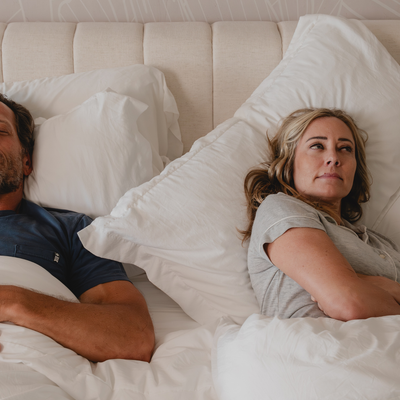January 23, 2024
Written by Nancy Kirk
There’s now a way to treat sleep apnea that does not involve a CPAP machine. It’s called an Oral Sleep Apnea Device (OSAD), and it’s an innovative device which requires no machines or special equipment. Instead, it’s simply placed inside the mouth each night to help prop your mouth open to improve breathing. The CPAP has long-been the gold standard when it comes to sleep apnea care, but experts are hopeful this can offer relief for those with mild-to-moderate sleep apnea, especially those who have had trouble adjusting to the CPAP.
How Does the New Sleep Apnea Oral Device Work?

The Oral Sleep Apnea Device (OSAD) is worn almost like a mouthguard, keeping your mouth in the ideal spot to support healthy breathing while you sleep. This OSAD device stabilizes the lower jaw and brings forward the tongue slightly to allow your airway to open naturally.
This is particularly helpful in preventing the stop-and-start breathing patterns caused by sleep apnea. Unlike CPAP machines, OSAD involves no face masks, electric cords, hoses, or machines. It also eliminates the noises caused by CPAP machines. This makes it a convenient and life-changing alternative for those with mild-to-moderate sleep apnea who want to try something which may be less intrusive.
How the OSAD Works
Oral Appliance Therapy (OAT) is designed to be simple and user-friendly. The process involves three straightforward steps.
Step 1: Consultation
Begin by chatting with Lofta sleep experts to determine if an oral appliance is suitable based on your home sleep test results.
Step 2: Molding
Take an in-home molding of your teeth and jaw using a kit we send straight to your door.
Step 3: Delivery
Receive your custom-made oral appliance by mail, ready for use. After it arrives, the Lofta team is here to help! We’ll discuss your progress and help address any concerns.
Click here to view the Lofta Oral Appliance
Pros and Cons of the Oral Appliance
Pros: The oral appliance offers a comfortable and compact solution, eliminating the need for cumbersome equipment. It is particularly effective for mild-to-moderate sleep apnea.
Cons: Some users may experience discomfort or find it challenging to adjust to wearing the appliance during sleep. It’s also not as effective for more severe cases of sleep apnea.
Why Is There an Alternative to CPAP?
CPAP has been the go-to treatment for sleep apnea since the ‘80s, and for good reason. Unfortunately, this doesn’t mean most patients are successful. That’s why our team is so dedicated to Lofta users on their journey through sleep apnea. The truth is, CPAPs can be challenging to get used to. Studies show only 23 to 45% of new CPAP users use it successfully in the long-term. This offers an alternative option for those who want to seek sleep apnea treatment, but can’t seem to incorporate their CPAP to their daily life.
Pros and Cons of the CPAP:
Pros: The CPAP’s primary strength lies in its effectiveness, especially for severe cases. The CPAP machine ensures a constant flow of air, preventing airway collapse. This helps patients sleep better, and feel healthier and more energized.
Cons: With face masks, hoses, and the need for electricity, some users find the CPAP to be uncomfortable or cumbersome to get used to. The noise generated by the machine can also be a potential downside.
Choose the Best Sleep Apnea Treatment for You
Regardless of the chosen treatment, our main goal is to help you treat your sleep apnea. Treating this condition offers tons of benefits, including better sleep, youthful energy levels, enhanced mood, and improved overall well-being. Whether through an oral appliance or CPAP, the focus should be on achieving quality sleep and mitigating the adverse effects of sleep apnea.
Wondering if You Should Try the Oral Appliance?
This ultimately depends on your individual preferences and the severity of the condition. If you have mild sleep apnea, the oral appliance might be a comfortable and hassle-free experience. For severe cases, sticking with the CPAP machine may be the best course of action. If you fall somewhere in between, exploring both options can help determine which works better for you.
Remember, the key is to choose a solution that aligns with your needs and improves your sleep quality. If you have any questions or need guidance, don't hesitate to reach out to sleep experts who can provide personalized advice based on your unique situation. Sweet dreams await as you embark on your journey to restful sleep!
Contact Lofta Today
Have questions? Contact us, and we’ll be happy to answer them.
Email us at sleep@lofta.com, or give us a call at 1-800-698-8000.
We look forward to helping you achieve better sleep!












































